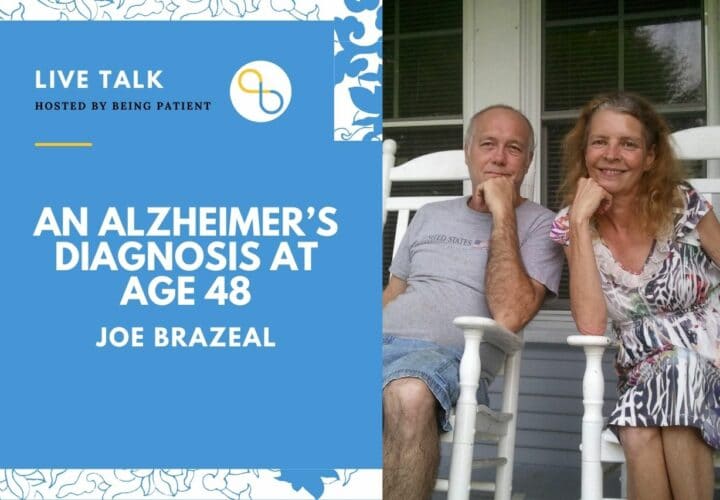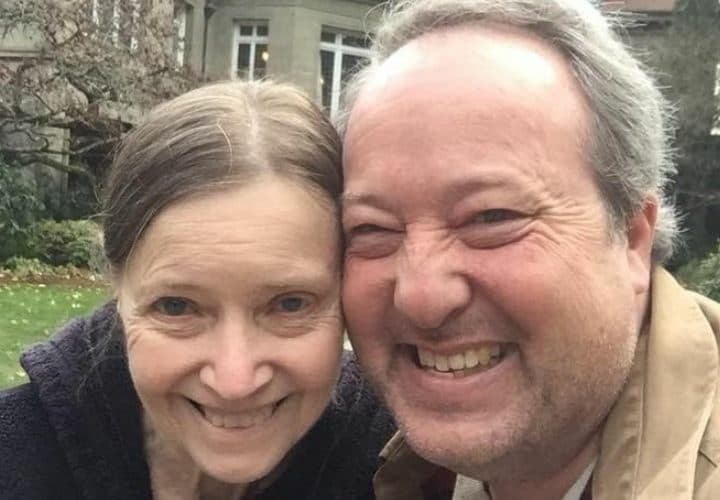Joe Brazeal reflects on lessons learned as a father and caregiver.
Joe Brazeal’s wife, Kimberly Brazeal, was only 42 years old when she began experiencing symptoms of cognitive and behavioral impairment. At the time, the couple was raising three young children. About six years later, at the age of 48, Kimberly was diagnosed with not only early-onset Alzheimer’s, but also lung cancer. The family weathered pain and chaos, and along the way, Joe’s faith and his devotion to Kimberly sustained him. His book, Living With Thunder: Alzheimer’s Untold, A Family’s Journey (2020), shares the invaluable lessons he learned.
Being Patient spoke with Joe about his wife’s early symptoms of Alzheimer’s, the wisdom he gained from his caregiving experience, and the good memories that the family shared with Kimberly, who passed away in 2018 at the age of 57. The following is an excerpt of the LiveTalk.
Being Patient: Tell us a little bit about your family.
Joe Brazeal: My wife was very beautiful, physically, mentally and spiritually. If you have ever watched I Love Lucy, she was pretty much like Lucille Ball. [She] had a great sense of humor. We laughed all the time. Her self-anointed nickname was motherlove. She was quite an interesting character, fun to be around.
We have three children. John is the youngest and he’s now 23. Joseph, the middle child, is 28 and Carrie is 30. They were all affected by this disease. They will tell you it caused a lot of anxiety for them, but we all survived.
“It’s important to have faith
and know that this too will pass.”
Being Patient: What were the early symptoms of Alzheimer’s that Kimberly started to experience?
Joe Brazeal: [The symptoms] started in about 2002. She started out [having] excruciating headaches. They just wouldn’t go away. She would go to every doctor in town and they would prescribe her these medications. And, she would self-medicate.
Then, she started forgetting things. She would drive up at 10 o’clock in the morning and wait for the children to get out of school. She would write a $20 check every day and she would never tell me about it. There was a lot of financial stress involved in our marriage. We were like $20,000 in debt. We fought all the time.
Being Patient: Ultimately, Kimberly was diagnosed with both early-onset Alzheimer’s and terminal lung cancer in 2008. Navigating all the challenges the family faced was very difficult for you. But the family made some great memories too, one of which was a trip to New York. Can you tell us more about that experience?
Joe Brazeal: We found a program that would take [terminally ill parents’] children [who are] 18 or under and give them [an] all-expense paid vacation. In 2012, Kim had finished her last radiation treatment, so we went to New York.
On her last day alive, she was having problems breathing. She was on morphine. I’d mentioned New York City, [and she had] a grin bigger than Texas. It burned in her psyche, her brain, her crystal palace, whatever you want to call it.
I would recommend anybody going through this [to] get all your affairs in order [and] go on these kinds of trips. Your life doesn’t have to end because you’re taking care of someone.
One of the things that you should do is take care of yourself first. Have a list in your pocket of things that somebody can help you with. Accept help. On a cruise [at] the Caribbean [for caregivers and people under their care], I gave a presentation of the four principles for health caregiving, and that is stress management, exercise, nutrition and continuous learning.
Being Patient: You wrote that having a confidant is vital, and along the way, you met Carl. Can you share with us the role that he played in your life?
Joe Brazeal: [First United Methodist] Church in Topeka had a program [that] matched you with somebody who had a similar experience. They matched me with Carl. In that particular time, I ended up with a grand mal seizure partly because of all the stress. If it wasn’t for Carl, I don’t know what I would have done.
He was my mentor. Every Saturday, we would have breakfast and he would just listen. Having somebody listening makes a huge difference. Find somebody that can mentor you through this. You have to have somebody that you can [talk to], because you feel so isolated.
Want to learn more about clinical trials
for Alzheimer’s and dementia?
Check out the Lilly Trial Guide.
Being Patient: What is the inspiration behind the book’s title?
Joe Brazeal: The title of the book was inspired by learning to live moment by moment, not hour by hour, day by day or week by week. You never know when or where [the lightning would strike] or the frequency [of these strikes].
The reason why I have the passion that I do is because I don’t want anybody to go through what I did. Honestly, when I was dealing with this disease, there were times I would have put a bullet through my head if I did not have my faith.
It’s important to have faith and know that this too will pass. My faith is John 3:16, “For God so loved the world that He gave His only begotten Son, that whoever believes in Him should not perish but have everlasting life.”
Being Patient: How are you doing now, several years on from Kimberly’s death?
Joe Brazeal: I have my moments. [She was] my world. I gave up my career to help her and my family through this, and then it was over.
There [are] no do overs in life. If you have an unresolved issue with somebody in your life, tell them you love them [and] work it out. Love is the answer and remember the day you got married. I remember the day that I told her I was going to marry her and I made a vow, ‘[Till] death do us apart.’
The interview has been edited for length and clarity.
Contact Nicholas Chan at nicholas@beingpatient.com



